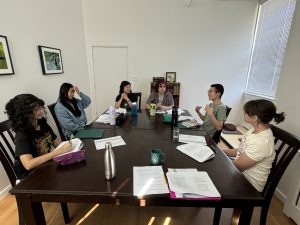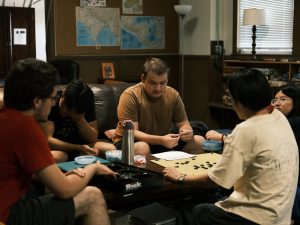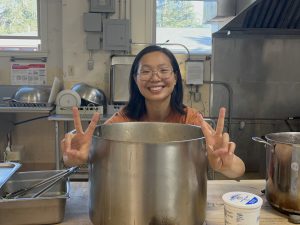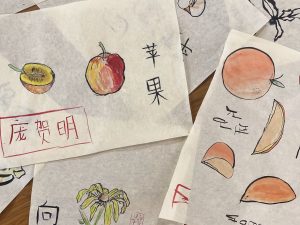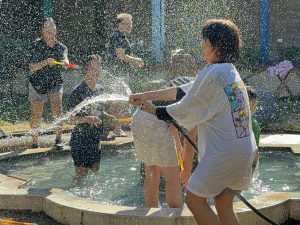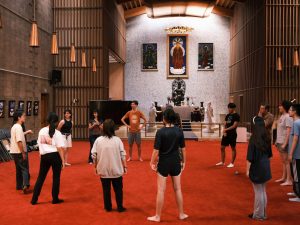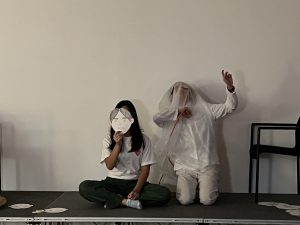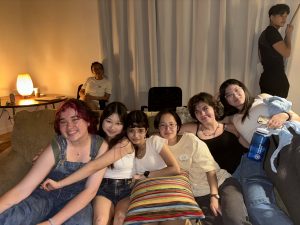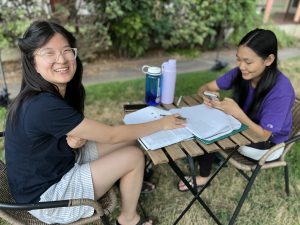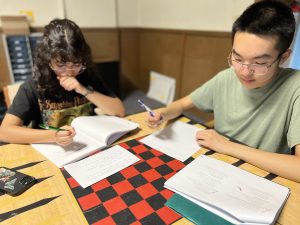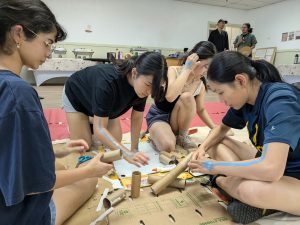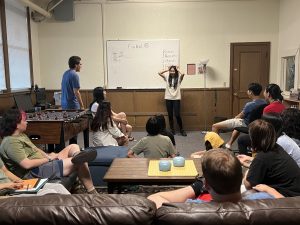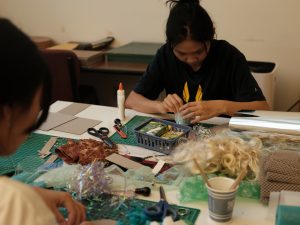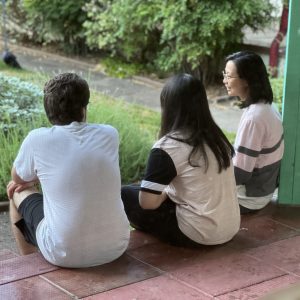
Reflections from Our First High School Program in Contemplative Philosophy
During two weeks in July, DRBU hosted its first-ever High School Program in Contemplative Philosophy. Twelve high school students traveled from around the country to the Sudhana Center in downtown Ukiah to immerse themselves in DRBU’s unique environment. The program is designed to give high school students a taste of life at DRBU. Campers read and discussed classic works of thought and literature, participated in workshops on art and contemplative exercise, shared community work, and had fun activities in the evenings and on the weekend.
The staff of the summer program was drawn from DRBU students, staff, and faculty. Some of the summer program staff offered reflections on their deeply fulfilling experience, noting how even the short period of the program led to profound personal and professional growth.
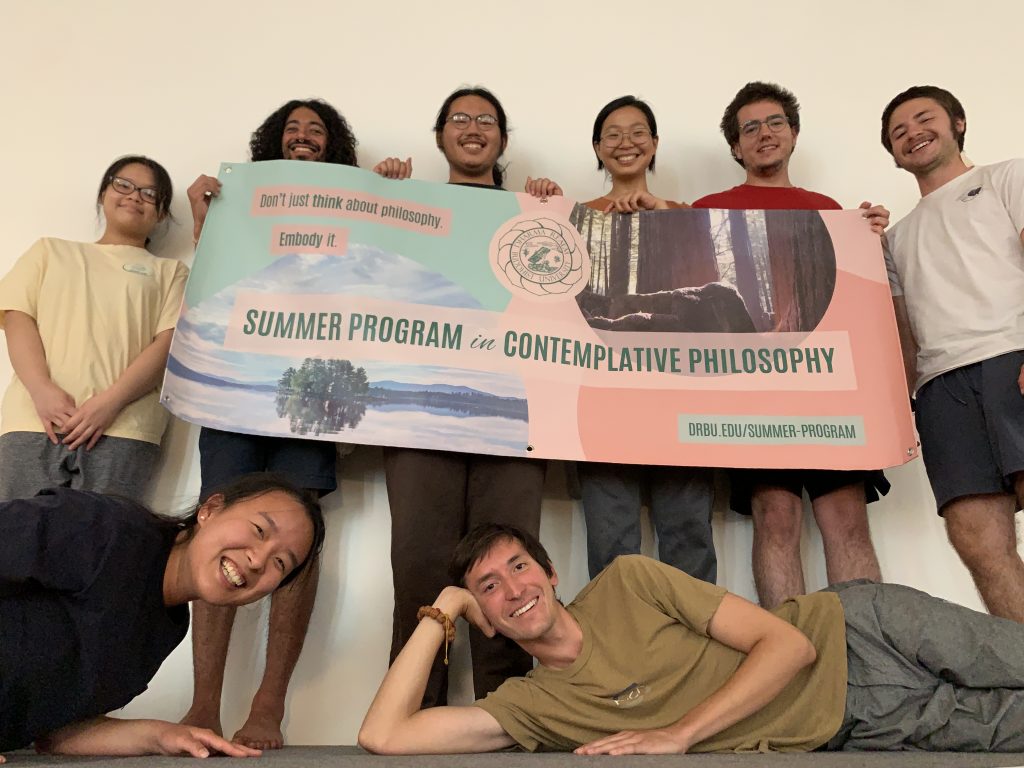
Nancy Cao, BA Class of 2027
Summer Program Role: Residential Assistant
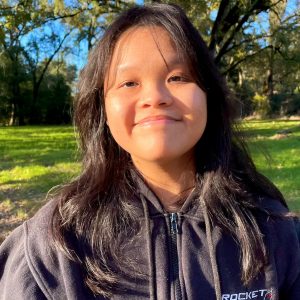
The three weeks of the program were such a special time for me to relearn how beautiful human connection is. It was so fun seeing people being close friends for just two weeks—their pureness, bursting into laughter at silly jokes and taking care of each other in the smallest things, to bring the vision of this summer camp to life. Seeing the bright eyes of the campers every day reminded me that there is something irreplaceable about being a teenager and being so enthusiastic in everything you do, without much hesitation.
My favorite memories are when my Air Nation Dumplings (the campers I was responsible for) prepared for their daily Koan Cup skit. In the Koan Cup, campers would act out koans as a group and be scored for their efforts. We were first place for almost two weeks, and I’m very proud of them as they put so much effort into that.
Another memory is the slideshow that me and Victoria (another DRBU student and summer program staff member) created for the closing ceremony. I think we spent more time than we were supposed to, but it was totally worth it. Having everyone cackling while watching the video indeed made me feel like I created something that was memorable for them.
A challenge I had was socializing, as all of a sudden there were so many people I had to interact with. One time during breakfast, all of the social tables were full, so I intended to sit alone, but the campers caught that and made space for me. But I was so anxious that I ended up rejecting them, reasoning “There’s not enough space.” Blake (a DRBU alumnus and summer program staff member), who was right there taking his oatmeal, replied to me, “Nancy, there will always be enough space.” I took that line of his close to heart, and it helped me gain more confidence in myself.
Looking back, my soul hasn’t felt so soft for years. This summer camp had a deeper impact on me than I thought it would, and I believe it’s the same for those who attended it. Two weeks can be so short to fully understand a human being (if that is even possible), but it was enough for me to have another understanding on why humans need each other. The simplicity of joy when someone gives you a sticker or includes you in something they do—appreciating those little things can make life so much more beautiful. I am so truly, deeply, wholeheartedly grateful for this experience.
Justin Howe, DRBU Admissions Counselor, MA Class of 2019
Summer Program Role: Discussion Seminar Leader
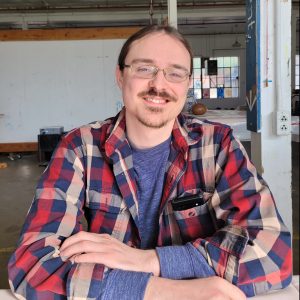
I helped to lead a morning discussion seminar on the topic “What is Truth?” It was a great learning experience for me and perfect professional development, since I’m hoping to work as a teacher in the future. I’ve led one-off discussion sessions for DRBU Outreach before, giving people a sense of what the DRBU classroom is like, but this was two weeks with the same group of students, so it was another level of commitment and attention. I’m really grateful for that opportunity.
I definitely learned a lot. I tried to pay close attention to the dynamic in the class and make sure that the students were enjoying themselves and seemed relaxed enough to share what they were thinking. One day during the first week, things weren’t going great in the first half of class, so I made some adjustments after our break. That seemed to create a better space for the students, and they opened up and started conversing more freely. I felt so happy about that. My job in the room wasn’t to teach but to help the students explore what we were reading together, and I think that changing things up that day went a little ways toward that end.
In terms of a memorable moment from the program, our weekend trip to Mendocino was a highlight. We went from scorching Ukiah heat to chilling ocean fogs and wind. Some of us were shivering under blankets during lunch! It was a good lesson to appreciate what comes. Sometimes even the uncomfortable is a welcome change. But overall what impacted me most deeply was the time I spent with the students in our shared seminar. It was so delightful getting to know them a bit and getting introduced to their perspectives. They were really insightful and brought out important ideas and themes from what we were reading. Building a community where we can all learn from each other is what DRBU is about. I think the students got a glimpse of that, so I’m really pleased.
Lauren Bausch, DRBU Professor
Summer Program Role: Discussion Seminar Leader
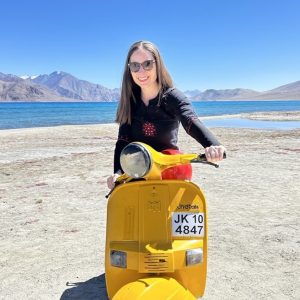
Hasan and his team—Blake, Alex, Ziqian, Squire, Alfonso, Caden, Anthony, Patrick, Victoria, and Nancy—are to be congratulated for organizing the first, and extremely successful, DRBU Contemplative Philosophy summer program. They thoughtfully and creatively transformed the Sudhana Center into a dynamic space suitable for summer camp that included seminar rooms, a yoga room, an art room, and a writer’s cave. The high school students who participated seemed to enjoy the combination of reading classical texts while simultaneously exploring a full schedule of entertaining activities like art, creative writing, karaoke, and koans.
I taught the seminar that explored, “What is Reality?” I was blown away by the openness of the students in my course. They were curious, flexible, and willing to engage with difficult and unfamiliar material with fewer obstacles than older students. Bonding together in activities all day long, the students were kind, supportive of their peers, and willing to listen. Organizing the seminars around themes like truth and reality made it possible to plunge deep into our topic and draw from classical texts from across the DRBU classical strands.
For example, we discussed how nothing should be added or taken away from “this,” but rather seen as it is, or, we could say, how it has been (Abhisamayālaṅkāra 5.21). On one hand, our reality is tied to our individual perception and we never quite seem to grasp the whole picture. On the other hand, ultimately reality is seeing things as they are without adding anything from our past experience or denying what is really there. Some might say, “that-ness” (tattva) or direct, immediate knowing (prajñā).
During the second week we spent a day on Abhidharma, which maintains that dharmas are ultimately real because, as the smallest unities of experience, they cannot be reduced any further; we also explored how conceptual designations (paññati) are not considered real because they can be broken down into smaller constituent parts. In addition, our class discussed the chariot metaphor in The Questions of King Milinda along with an excerpt from Nietzsche’s “On Truth and Lies in a Nonmoral Sense,” in which concepts never adequately express the original experience. A productive discussion ensued around the limits of understanding reality through language. For example, one student asked important questions about what is included under concepts, what goes into such distinctions, and what is lost when we apply them to our understanding of experience. Another student distinguished between dependently arising processes and the “thing in itself”.
On the last day, a student reflected that they would think twice about “their” emotion next time it arises. They wouldn’t just take it to be part of them, but rather they would question where that emotion came from and where it would lead. That kind of awareness is very satisfying for a teacher to see in a student.
So many conditions came together to make what was taught in this seminar on reality, and of course the entire summer program, possible. And just as quickly as those innumerable conditions arose, they also passed away, giving way to the seeds of future experiences and possibilities.
